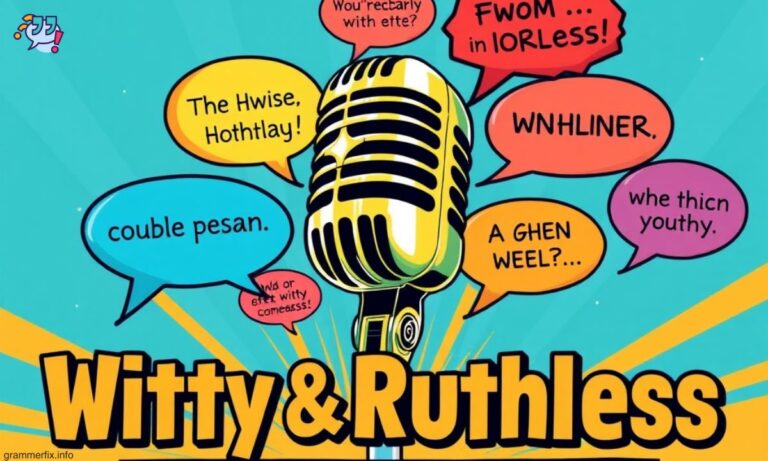Sometimes, people just won’t stop talking, and you need the perfect comeback to shut them down. A witty response with a ruthless edge can leave them speechless.
Whether it’s sarcasm, humor, or pure logic, the right words can end any argument in seconds. Get ready to master the art of the perfect clapback!
Top 39+ Best Comebacks to Shut Someone Up
Tired of dealing with annoying people who just won’t stop talking? A sharp and clever comeback can silence them in seconds. From funny replies to savage roasts, these comebacks will help you take control of any conversation. Get ready to shut them up with style.
1. “I’m sorry, I didn’t realize you were an expert on my life.”
Some people love to act like they know everything about you. This comeback is perfect for shutting them down with sarcasm. It reminds them that they actually have no authority over your choices.
*Example: “You should quit your job and follow your passion.”
Response: “I’m sorry, I didn’t realize you were an expert on my life.”
2. “Does talking like that make you feel better?”
When someone is being rude or condescending, this response flips the script. It forces them to reflect on their words and might make them rethink their attitude.
*Example: “You always mess things up.”
Response: “Does talking like that make you feel better?”
3. “Oh, I didn’t know you had a degree in everything.”
Some people act like they know everything. This sarcastic reply exposes their overconfidence and makes them realize they might not be as smart as they think.
*Example: “You’re doing it all wrong. Let me tell you how it’s done.”
Response: “Oh, I didn’t know you had a degree in everything.”
4. “It must be exhausting, knowing everything about everything.”
For those who love to dominate every conversation, this comeback is perfect. It subtly mocks their need to be the smartest person in the room.
*Example: “Actually, that’s not how it works. Let me explain…”
Response: “It must be exhausting, knowing everything about everything.”
5. “Wow, I didn’t ask for your opinion, but thanks for sharing.”
Sometimes, people love giving unsolicited advice. This response makes it clear that their input was neither needed nor wanted.
*Example: “You should really dress differently.”
Response: “Wow, I didn’t ask for your opinion, but thanks for sharing.”
6. “I’ll consider that when I’m taking advice from someone I respect.”
A sharp way to dismiss unwanted opinions, this line lets them know that their words carry no weight with you.
*Example: “You need to be more like me.”
Response: “I’ll consider that when I’m taking advice from someone I respect.”
7. “I’ve heard worse from better people.”
If someone tries to insult you, this comeback minimizes their impact. It implies their words mean nothing to you.
*Example: “You’re terrible at this.”
Response: “I’ve heard worse from better people.”
8. “Are you done, or is there more to your little speech?”
Perfect for when someone just won’t stop talking. It adds a bit of sarcasm while making them aware of their excessive rambling.
*Example: “And another thing, you also never listen!”
Response: “Are you done, or is there more to your little speech?”
9. “I’d agree with you, but then we’d both be wrong.”
This witty remark is great for when someone says something completely ridiculous. It subtly roasts them while making you sound clever.
*Example: “You should just give up, you’ll never be good at this.”
Response: “I’d agree with you, but then we’d both be wrong.”
10. “Please, keep talking. I always yawn when I’m interested.”
If someone is boring you with unnecessary chatter, this sarcastic response is perfect for making them realize they should probably stop.
*Example: “And that reminds me of another story…”
Response: “Please, keep talking. I always yawn when I’m interested.”
11. “That’s cute, but nobody cares.”
Sometimes, people share things that might be interesting to them but don’t really matter to anyone else. It’s a lighthearted way of telling someone that their comment or story isn’t as engaging as they think.
Example:
Tom excitedly explained how he spent three hours organizing his sock drawer. Lisa smirked and said, “That’s cute, but nobody cares.”
12. “You sound better when you’re quiet.”
There are moments when silence is truly golden. When someone keeps talking without adding value, this phrase is a sharp but humorous way to suggest they stop.
Example:
James kept giving unwanted relationship advice, despite being single for years. Sarah sighed and said, “You sound better when you’re quiet.”
13. “You have the right to remain silent. Please exercise it.”
This phrase playfully borrows from legal terminology to tell someone they should probably stop talking before making things worse.
Example:
Brian started explaining quantum physics at a party, even though he barely passed science class. Emma rolled her eyes and said, “You have the right to remain silent. Please exercise it.”
14. “Thanks for your input, it’s been filed under ‘not necessary.’”
When someone gives an opinion that wasn’t asked for, this phrase sarcastically dismisses it as completely irrelevant.
Example:
Karen interrupted the meeting to suggest they switch to paper memos instead of emails. Mark sighed and said, “Thanks for your input, it’s been filed under ‘not necessary.’”
15. “Your opinion is like a broken pencil—pointless.”
A witty way to express that someone’s viewpoint doesn’t hold any weight or value in a conversation.
Example:
Tom insisted pineapple on pizza is a crime against humanity. Alex shrugged and replied, “Your opinion is like a broken pencil—pointless.”
16. “I’m sure you’ll find someone who cares, eventually.”
A sarcastic way to tell someone that their story or opinion isn’t of interest, but maybe someone, somewhere, will care.
Example:
Mike kept bragging about his new high score in a game nobody played. Sarah smirked and said, “I’m sure you’ll find someone who cares, eventually.”
17. “You should probably stop talking before you embarrass yourself.”
This phrase is used when someone keeps digging themselves into a hole with their words.
Example:
Jessica tried to explain why she thought the Earth was flat. David shook his head and said, “You should probably stop talking before you embarrass yourself.”
18. “Funny how people with no clue always have the most to say.”
People who don’t know much about a topic often talk the most. This phrase points out the irony in that.
Example:
Eric, who had never owned a pet, kept giving dog training tips. Sam chuckled and said, “Funny how people with no clue always have the most to say.”
19. “I’ll let you know when I start caring.”
A blunt way to tell someone that their story or opinion doesn’t interest you in the slightest.
Example:
Linda spent ten minutes explaining her dream from last night. Jake yawned and said, “I’ll let you know when I start caring.”
20. “That was a great story, but too bad nobody asked for it.”
Sometimes, people overshare without realizing nobody wanted to hear their story. This phrase points that out humorously.
Example:
Ethan went on a rant about his childhood fears. Maya laughed and said, “That was a great story, but too bad nobody asked for it.”
21. “You really have a way with words… too bad they don’t make sense.”
A sarcastic compliment for someone who speaks well but doesn’t actually say anything meaningful.
Example:
Oliver kept using fancy words incorrectly. Sophia smirked and said, “You really have a way with words… too bad they don’t make sense.”
22. “I think your silence speaks volumes, so let’s stick to that.”
When someone’s quietness is more valuable than their talking, this phrase suggests they should keep it that way.
Example:
Chris tried to explain a topic he clearly knew nothing about. Anna interrupted, “I think your silence speaks volumes, so let’s stick to that.”
23. “Interesting opinion. Too bad I don’t care.”
A dismissive way to acknowledge someone’s viewpoint while making it clear you’re uninterested.
Example:
Daniel passionately argued about the best burger toppings. Lisa shrugged and said, “Interesting opinion. Too bad I don’t care.”
24. “Oh, I’m sorry, I didn’t realize I asked for your thoughts.”
Used when someone gives unsolicited advice or opinions, making it clear they weren’t invited to the discussion.
Example:
Sophia criticized Jake’s outfit without being asked. He replied, “Oh, I’m sorry, I didn’t realize I asked for your thoughts.”
25. “Do you ever get tired of talking just to hear yourself?”
For people who talk excessively without saying much of value, this phrase questions their motivation.
Example:
Tom kept repeating the same point in the meeting. Sarah sighed, “Do you ever get tired of talking just to hear yourself?”
26. “Wow, you sure know how to waste everyone’s time.”
A sharp remark for people who talk aimlessly or give long, pointless speeches.
Example:
The professor went on a 30-minute tangent about unrelated topics. A student whispered, “Wow, you sure know how to waste everyone’s time.”
27. “If ignorance is bliss, you must be the happiest person alive.”
This phrase is used to point out someone’s lack of knowledge or awareness on a subject, often in a mocking or sarcastic tone.
Example:
Megan argued about the benefits of eating junk food while ignoring all health facts. Tom said, “If ignorance is bliss, you must be the happiest person alive.”
28. “Sorry, I don’t speak nonsense. Could you translate that?”
This playful remark indicates that what someone said didn’t make sense and suggests they explain it more clearly.
Example:
Dave rambled on about conspiracy theories in a confusing way. Mark replied, “Sorry, I don’t speak nonsense. Could you translate that?”
29. “I’m trying to see things from your perspective, but I can’t get my head that far up.”
This sarcastic response highlights the absurdity of someone’s viewpoint by exaggerating how difficult it is to understand.
Example:
Jenny kept defending her outlandish opinions on social media. Tom shook his head and said, “I’m trying to see things from your perspective, but I can’t get my head that far up.”
30. “If I wanted your opinion, I would’ve asked for it.”
A direct and blunt way to tell someone their unsolicited advice or comments are unwelcome.
Example:
During a quiet lunch, Rachel decided to offer advice on how to decorate the office. Sarah quickly responded, “If I wanted your opinion, I would’ve asked for it.”
31. “I’d love to agree with you, but then we’d both be wrong.”
This sarcastic line suggests that agreeing with someone would make both of you wrong, highlighting the flaws in their argument.
Example:
John argued that cereal should be eaten with water. Emily replied, “I’d love to agree with you, but then we’d both be wrong.”
32. “You should put that on a t-shirt because nobody cares.”
This phrase implies that someone’s statement is so trivial that it would make a better novelty item than something worth listening to.
Example:
Mark spent 20 minutes explaining his opinion on ketchup brands. Lisa replied, “You should put that on a t-shirt because nobody cares.”
33. “Are you finished, or should I bring popcorn for the show?”
A sarcastic remark used when someone talks for an extended time, often when they’re saying something irrelevant or tiresome.
Example:
Dan gave a long-winded explanation about why he hates Mondays. Paul replied, “Are you finished, or should I bring popcorn for the show?”
34. “Your level of self-confidence is impressive… and misplaced.”
This phrase acknowledges someone’s confidence but humorously suggests that it’s not justified by their abilities or understanding.
Example:
Jessica boasted about her dancing skills even though she had no rhythm. Mike chuckled and said, “Your level of self-confidence is impressive… and misplaced.”
Read This Blog: Grandchildren Are a Gift: 20 Beautiful Quotes to Cherish
35. “I’ve seen vegetables with more brains than you.”
A sharp insult implying that someone is lacking intelligence, comparing them to something that’s typically considered “not smart.”
Example:
Matt kept misunderstanding simple instructions at work. Claire finally snapped, “I’ve seen vegetables with more brains than you.”
36. “Did I ask for your unsolicited advice? Oh wait, I didn’t.”
This phrase is used when someone gives advice without being asked, directly pointing out that it wasn’t needed.
Example:
Lucy told her friend how to manage her finances, even though she wasn’t asked. Sarah responded, “Did I ask for your unsolicited advice? Oh wait, I didn’t.”
37. “You know, silence is golden. You should try it sometime.”
This phrase suggests that the person would be better off not speaking, offering the idea that silence is more valuable than their words.
Example:
Harry kept interrupting the meeting with irrelevant points. Jessica said, “You know, silence is golden. You should try it sometime.”
38. “Bless your heart. That was almost an opinion.”
A sarcastic comment that implies the person’s statement was so far from being a real opinion that it’s almost comical.
Example:
Bob tried to explain the meaning of life based on a meme he read. Sarah smiled and said, “Bless your heart. That was almost an opinion.”
39. “I’d listen to you, but I have better things to do—like anything else.”
A blunt way to express that you’d rather do anything else than listen to someone talk, implying their words are unimportant.
Example:
Peter rambled on about a TV show nobody cared about. Tim replied, “I’d listen to you, but I have better things to do—like anything else.”
Extra Tips for Using Comebacks Like a Pro
Stay Calm and Collected: The best comebacks are delivered with poise, not anger. Keep your emotions in check to ensure you don’t escalate the situation.
Be Witty, Not Mean: A clever and funny comeback is far more effective than a hurtful one. Aim to make people laugh, not feel bad.
Know Your Audience: Tailor your comebacks to the person and the situation. What works with close friends might not fly in a professional setting.
Timing is Everything: A great comeback can lose its impact if it’s delivered at the wrong moment. Wait for the right opportunity to strike.
Don’t Overdo It: While a well-timed comeback can be hilarious, using them too often can come off as rude or exhausting. Use them sparingly to maintain their charm.
Frequently Asked Questions
What is a comeback?
A comeback is a witty or clever reply to a remark, often used to counter criticism or humor.
How do I come up with good comebacks?
Good comebacks often rely on humor, timing, and a clever twist on the other person’s statement.
Are comebacks always appropriate?
No, comebacks should be used carefully, considering the situation and the feelings of others.
How can I improve my comeback skills?
Practice by staying calm, observing others, and thinking creatively about how to respond.
Can comebacks be used in professional settings?
Yes, but they should be more subtle and respectful to maintain professionalism and avoid conflict.
Conclusion
People often use comebacks to respond quickly in conversations. They can be funny, sharp, or even sarcastic. A good comeback can turn a situation around and make people laugh.However, not all comebacks are appropriate. Sometimes, they can hurt feelings or make things worse. It’s important to know when and how to use them.

Atiqa is a talented content writer and digital marketer with expertise in SEO, social media management, and online marketing. She excels at creating impactful, data-driven content to help businesses connect with their target audience and achieve measurable outcomes.

